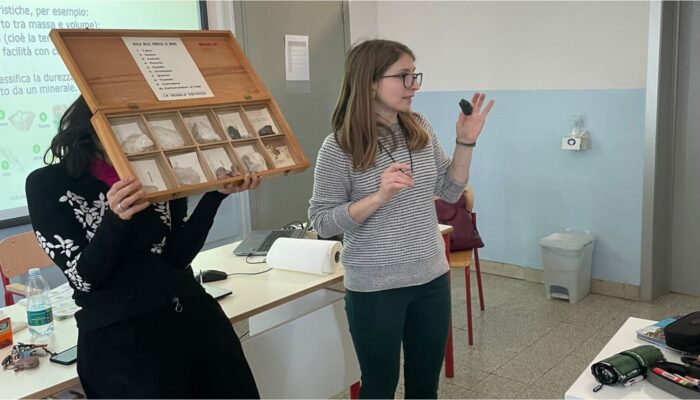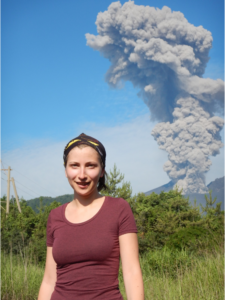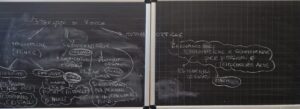
Valeria Cigala (Ph.D.) is a geoscientist by education and an expert in explosive volcanism and related hazards. She has been the Early Career Scientists Representative for the Natural Hazards Division of EGU from 2019 to 2022 and Editor-in-chief of our blog. Valeria is currently employed as a maths and science teacher at the middle school level in Italy. In this inspiring interview, she is sharing with us the challenges and opportunities of moving from academia to middle school teaching.
 Hi Valeria! Thank you for answering my questions today. Can you tell us more about your previous experience as a geoscientist in academia and why you decided to move to middle school teaching?
Hi Valeria! Thank you for answering my questions today. Can you tell us more about your previous experience as a geoscientist in academia and why you decided to move to middle school teaching?
Hi Silvia, thanks for having me! My geoscience journey took me from studying geology in Milan to pursuing research in places like Michigan, France, and Germany. It was an incredible adventure that I truly enjoyed. However, along the way, I realized the need for a backup plan in case the constant moving became not sustainable. I discovered a passion for science communication and sharing knowledge during my PhD. This led me to explore teaching as an option, and I won a state competition that landed me a position as a maths and science teacher at a middle school (6th – 8th grade) in Milan. I recently completed my first-year evaluation, and I’m thrilled to say my position is now permanent. I love the opportunity to inspire young minds and make a lasting impact on their education.
Changing jobs, duties, and context is never easy. What have been the major challenges you encountered in this new tough job as a teacher, and how did you manage them?
Transitioning to teaching came with its share of challenges. In the Italian system, you’re immediately thrown into the classroom, after successfully passing the state competition, regardless of prior teaching experience. I must admit that in the first few months, the job felt more intense than I had initially anticipated, and I questioned whether I had made the right choice. Revising concepts, in particular, on topics in science like human anatomy, which are not my specialty, preparing lectures and tests, as well as dealing with different teaching and learning methods. However, I found my stride after the winter break and genuinely enjoyed the role.
One of the great and simultaneously daunting aspects of teaching is that every day brings a fresh experience to the students. You never quite know what to expect, but witnessing their smiles when they overcome a particularly challenging problem makes it all worthwhile. Additionally, I’ve been fortunate to have a supportive team of colleagues who have made a significant difference in my journey. As this was an evaluation year, I had the guidance of a seasoned maths and science teacher who served as my tutor. Having someone to discuss and exchange teaching methods with has proven invaluable.
Your scientific mindset represents an added value for your new job. Which aspects, knowledge, or skills from your previous background as a geoscientist are you still successfully applying in your current position?
Absolutely! One of the rewarding aspects of my current role is being able to teach about rocks, minerals, and volcanoes (of course). It sparks interesting discussions when students are curious. Furthermore, my academic background has equipped me with valuable skills I continue to apply in teaching. Effective communication, honed through public speaking engagements and overall scientific discourse, allows me to connect with students and convey complex concepts. Additionally, the problem-solving and technological skills I developed have proven beneficial in finding innovative ways to engage students and enhance their learning experiences.
Do your students know that their teacher is a volcanologist? Did you have any chance to share your experience with them? Are they curious about geoscience?
Oh yes, they know. I shared my background as a volcanologist with my students on the first day we met, hoping to spark their curiosity. Some of them were pleasantly surprised, while others had no idea that being a volcanologist was a real profession. After our initial introduction, some students mentioned that they had watched videos of me on YouTube talking about volcanoes and even asked me questions.

Scheme of the three main rock groups that Valeria defined together with the kids while looking at samples in the lab.
How geosciences and, more specifically, natural hazards are currently addressed in the teaching programs of middle schools in Italy?
It’s an interesting question, and, in my little experience, the approach to the topic can vary depending on the teacher’s background. In the middle school where I currently teach, I am the only teacher with a geology background, as biology and biotechnology are more common backgrounds. As a result, I’ve incorporated lessons on volcanic and seismic hazards into my classes. However, this may only be the case in some schools or classes of the same school. Given the breadth of the science curriculum in middle school, it’s impossible to cover every topic in depth without merely scratching the surface. Consequently, teachers often focus on their specific specialties, which is a reasonable approach, in my opinion. Additionally, due to the vastness of the program, choices must be made, and specific topics, such as basic knowledge of the human body and illness prevention, hold importance at this age level and are generally given priority.
Thanks for sharing your experience with us. Is there any final suggestion you would like to share for people in academia who are considering following your same path as an option for their future careers?
Suppose you think you have the right predisposition and happen to be considering a teaching career in school. In that case, I think the best advice I could give you is to check out 1) the educational background and competencies requested to even be considered for the role and 2) the selection procedure. As I discovered chatting with people living in different countries, these two points can vary greatly.
